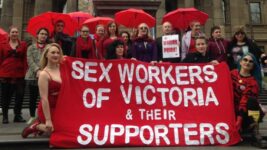Victoria Decriminalises Sex Work: A Victory for Workers

Tuesday saw Victoria become the third jurisdiction in Australia, and the fourth globally, to decriminalise sex work. This will see the local industry operate in accordance with regular business laws, as well as the improvement of standards and the enhancement of sex workers’ wellbeing.
The Sex Work Decriminalisation Bill 2021 passed the lower house on 22 February, however this was merely a formality, as the government bill was guaranteed the final vote, and the real work had been done in amending the legislation and passing it through the upper house on the 10th.
The driving force behind the bill – which sees an end to the problematic two-tiered legalised licensing system of the mid-1990s – was Reason MLC Fiona Patten, who led the 2019 decriminalisation parliamentary review, which made the recommendations that shaped the laws.
Patten explained last July that the new system will provide workers with “greater access to health services, workplace health and safety protections and also less fear in coming forward when they do experience crime”.
But the Reason Party leader added that more work needs to be done in terms of antidiscrimination protections.
Sex work is work
NSW became the first jurisdiction on the planet to decriminalise sex work in 1995. This system removed the criminal sanctions that had applied to working within the industry, and it was a broad recognition that consensual adult sex work is a legitimate form of paid employment.
New Zealand subsequently became the first country to decriminalise its sex industry nationwide in 2003, while the Northern Territory passed laws in December 2019, which brought an end to criminalising and penalising those who work within the industry.
Indeed, Amnesty International adopted a policy to uphold the rights of sex workers in May 2016, which asserts decriminalisation as best practice. In doing so, the organisation recognised “the high rates of human rights abuses experienced globally by individuals who engage in sex work”.
The path ahead
Along with Patten, sex worker organisations the Scarlet Alliance, Australian Sex Workers Association and Victoria’s peer-only sex worker organisation Vixen Collective helped shape and inform the initial parliamentary review, as well as the government bill.
In a joint statement, Vixen and Scarlet Alliance applauded the Andrews government for passing the laws that will see their industry regulated like any other, and also will repeal “the criminalisation of HIV and STI for sex workers”. The organisations also thanked Patten for “her ongoing support”.
Wei Thai-Haynes from Sydney-based LGBTIQ organisation Pride in Protest told Sydney Criminal Lawyers that she congratulates Victoria on passing decriminalisation, as her organisation is currently campaigning for the removal of criminal sanctions for sex work nationwide.
“We don’t have nationwide decriminalisation yet. Sex work is still illegal in South Australia, Western Australia, Queensland and Tasmania,” Thai-Haynes advised.
“Looking at NSW, there are still concerns around the rights of sex workers. There are no antidiscrimination protections afforded to them.”







